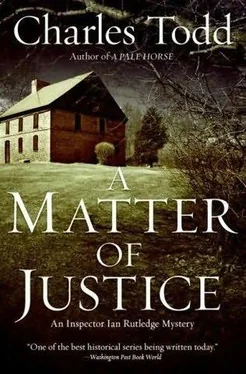"With the right goad, even people like Penrith can kill," Rutledge answered neutrally.
"There's more to this business of Quarles and Penrith. Since my telephone call to you, I was told something by a friend, in strictest confidence. I trust you'll treat it as such. There was a fair sum of money going up the line the day the Boer attacked. I'm not privy to why it was on the train, just that it was. It was burned when the carriages caught fire after the attack. There was some question in the doctors' minds whether-judging from the nature of his wounds-Quarles was trying to save the money or Lieutenant Evering. The Army kept an eye on him, but after Quarles got back to London, he was poor as a church mouse. And so after a time, the Army lost interest in him. A man of that sort, they reckoned, would have spent every penny in months, if not weeks, on whatever whims took his fancy. Instead he worked hard in the firm that hired him, rose through their ranks on his own ability, and led an honest life."
It explained why Penrith wouldn't talk-he had been given a share of that money. It explained why Lieutenant Evering had to die-he would have told everyone if Quarles had taken the money. It explained why the carriages had to be burned-otherwise the Army would have searched for the missing currency. And still they had been suspicious. But Quarles had outwaited them, clever man that he was.
It had all begun with greed. With money that could be had for the taking, if one had no qualms about committing murder.
Rutledge said, "Thank you for telling me. It will go no further."
"Just as well," Caldwell said. "It will only hurt the survivors. But I thought it might be useful to you."
Pray God, Rutledge thought, Michael Brunswick never learns the truth. Or if he does, never acts on it. Or the killing will go on.
And Marcus Quarles might prove to have more of his father and his aunt in him than his mother ever imagined…












